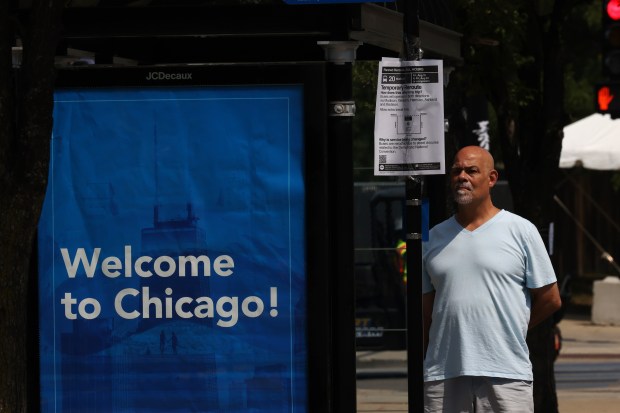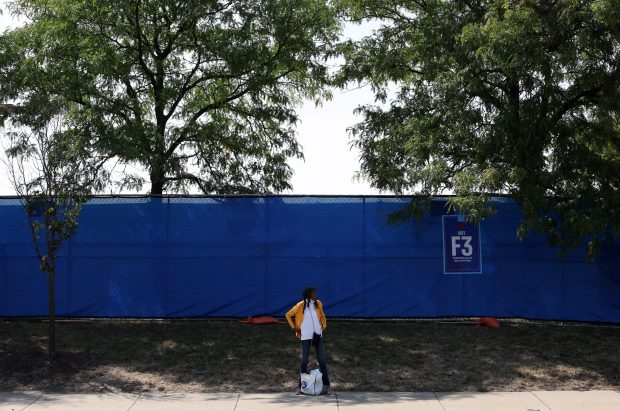Large events like the Democratic National Convention have huge carbon footprints, from transporting crowds to powering large facilities and feeding thousands.
Globally, the events industry is responsible for over 10% of annual CO2 emissions, according to a 2021 study.
“Things are happening all around us — changing weather patterns and so forth — that have really helped frame the dialogue for organizations about why sustainability has to be a priority,” said Amy Calvert, the CEO of the Events Industry Council, a member group for event organizers.
On the heels of the Paris Olympics, whose organizers boldly pledged to halve the summer games’ carbon footprint compared with the average of previous Olympics, over 50,000 people are expected to gather in Chicago this week for the DNC. And convention organizers are making similarly bold statements, promising “the most sustainable Democratic convention in history,” according to a committee spokesperson.
The city of Chicago and the DNC have partnered on several initiatives to boost sustainability, with transportation top of mind.
The more people traveling from out of town, the higher an event’s carbon footprint is. According to the DNC Sustainability Guide, transportation accounts for 70% to 90% of event-related emissions.
The DNC committee is encouraging delegates to consider lower-emissions options like trains, cars and buses over flights, when possible. To compensate for inevitable emissions produced en route to Chicago, the committee is asking attendees to donate to Growing Home, a nonprofit regenerative farm in Englewood that expands access to local organic produce.
Once travelers are in Chicago, attention is on public transportation access, clean energy supply at venues and waste mitigation.
While there is no uniform system to measure the effectiveness of all these strategies, said Calvert, the DNC sustainability efforts work to advance more grandiose aims of the Democratic Party and the city of Chicago.
Climate change has catapulted into public consciousness since Chicago last held the DNC in 1996, with Democrats largely owning the issue and many Republicans rejecting it. Former President Barack Obama signed the nation on to the Paris Climate Accord, an international climate change mitigation treaty. Former President Donald Trump withdrew from the treaty less than a year into his presidency and President Joe Biden rejoined it his first day in office.
The Republican National Convention committee did not respond to requests for comment on sustainability efforts during the GOP’s convention last month.
Meanwhile, the DNC’s initiatives will affirm the Democrats’ commitment to the environment, according to the spokesperson. Mayor Brandon Johnson’s administration also sees the upcoming convention as “an opportunity to set the bar high for future events,” said the city’s chief sustainability officer, Angela Tovar.
Tovar and her team in city government have set out to make intracity public transportation more accessible.
Convention attendees will receive discount codes for Divvy, Spin and Lime bikes and scooters, she said. Her team is also working with the ride-share operators to ensure there are ample docking stations around the United Center and McCormick Place Convention Center, the two primary DNC venues.
City buses will be available to transport attendees around the city as well. To further reduce the carbon footprint of this already low-emissions transportation option, drivers are being asked to wait in venue-adjacent comfort centers rather than leave their buses idling between routes.

The convention also lit the fire beneath the Johnson administration to accelerate ongoing sustainability projects.
The long-awaited Damen Green Line station opened earlier this month, filling a 1.5-mile gap between “L” stops that provides much-needed accessibility to the United Center. And the city has been busy planting thousands of trees, which improve air quality and provide shade, in addition to beautifying the city.
“When you have something like the DNC where the world’s eyes are going to be on you, it provides a little extra incentive to get it done a little bit faster,” said the city’s chief operating officer, John Roberson.
All these efforts are similar to those seen at the Paris Olympics; the French city expanded bus, metro and train services by 15% and installed new bike lanes.
The majority of operations in the United Center will be powered by clean electricity rather than standard diesel-powered generators, the DNC committee spokesperson said. Diesel generators emit two times more emissions than an electrical grid for the same amount of power, according to the engineering firm Facilities Engineering Associates.
The Paris Olympics similarly aimed to use 100% renewable energy and connected venues to the electricity grid to minimize the use of diesel generators.
The DNC committee is working closely with the venues to minimize waste as well. The goal is to triple the United Center’s current recycling capacity by adding additional bins and instructional signage, according to the spokesperson. This convention will also be the first DNC to offer composting bins.
Food is getting a lot of thought before it ends up in the compost bins, too.
Caterers are being encouraged to source food from farms within a 250-mile radius of Chicago, which will reduce transportation emissions and support local economies. They are also being asked to consider local taste preferences and food service practices to maximize the amount of untouched food that can go to communities in need.
The DNC and city have secured an overflow kitchen and partnered with community-based organizations to facilitate food distribution.
The Paris Olympics organizing committee also pledged to minimize food waste by composting, donating and producing renewable gas with leftovers.
Ultimately, the Johnson administration and the DNC organizers see this week’s convention as a chance to position themselves as leaders in sustainability.
“Chicago is innovative,” Roberson said. “Just like we reverse-engineered the Chicago River, just like we are the mecca for architecture, I’m very excited about the innovative sustainability approaches we’re taking at this convention.”
The execution and effectiveness of their strategies remain to be seen. Nevertheless, the comparable sustainability strategies taken at the DNC and Paris Olympics reveal patterns emerging in how organizers are thinking about large events on a warming planet.



